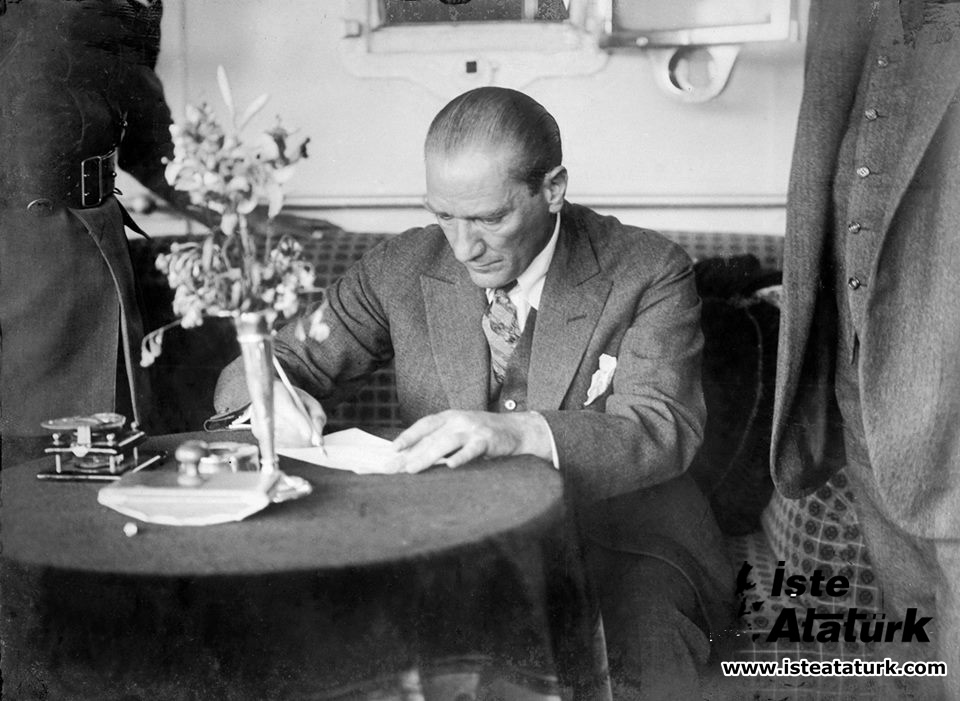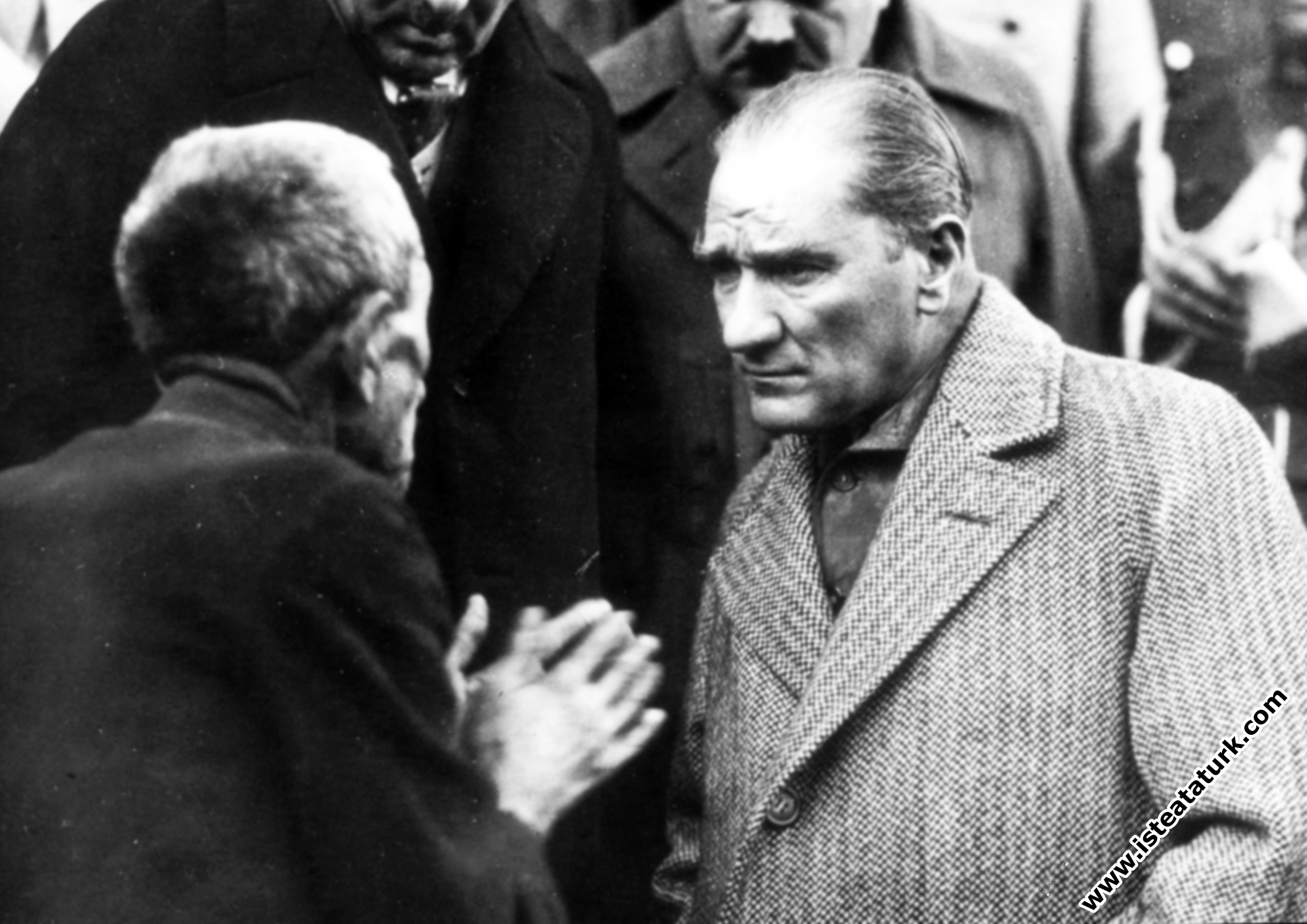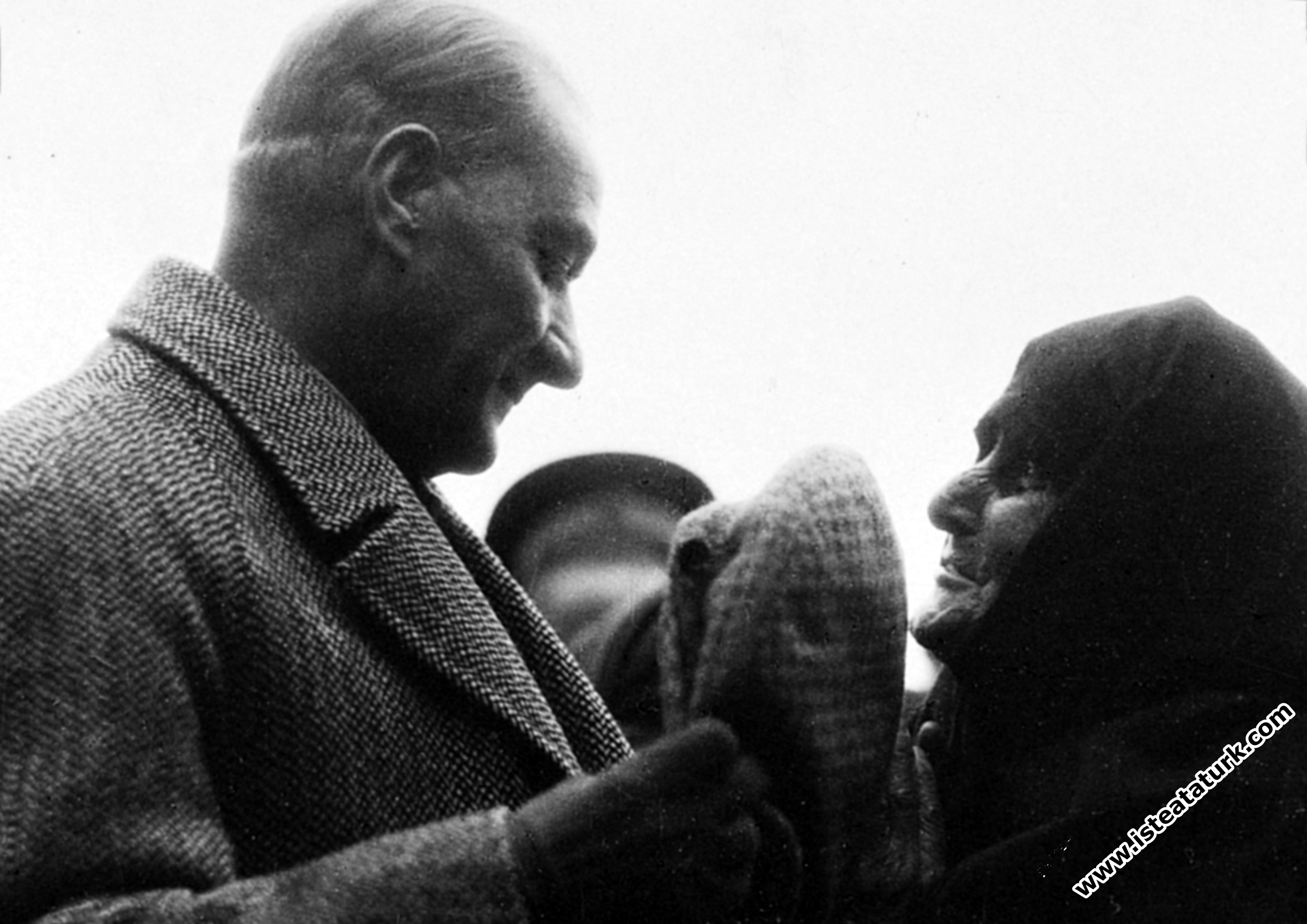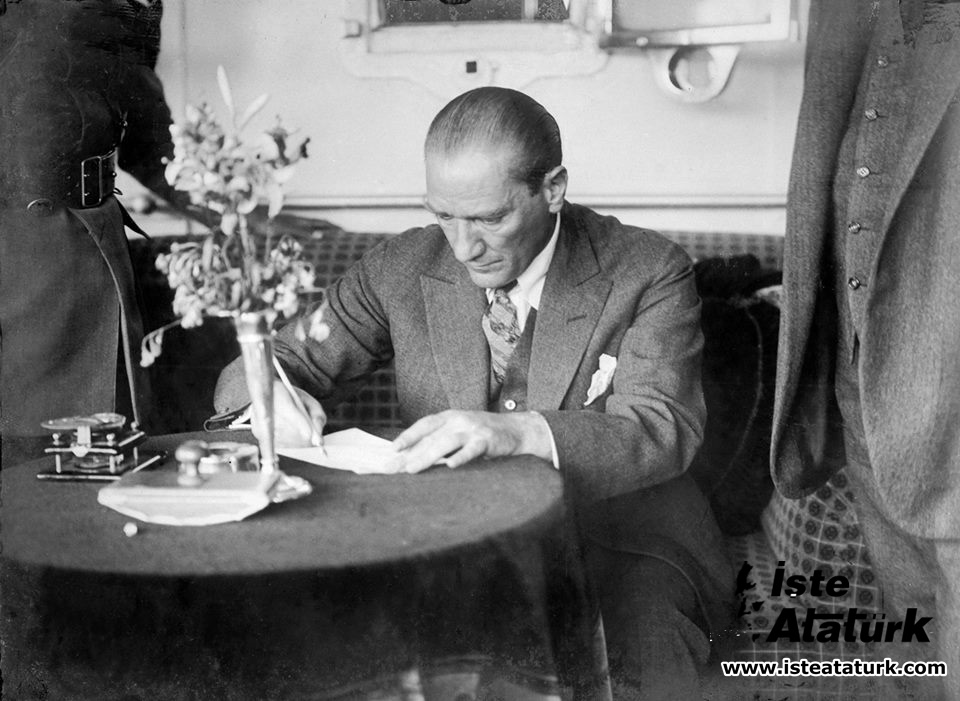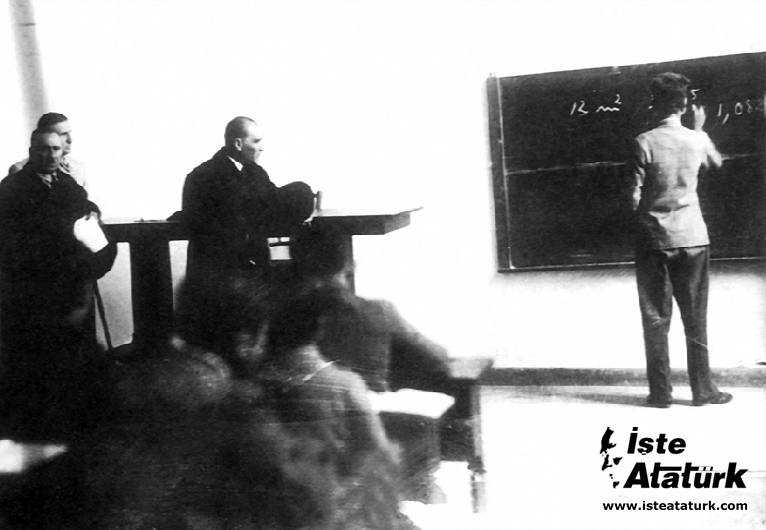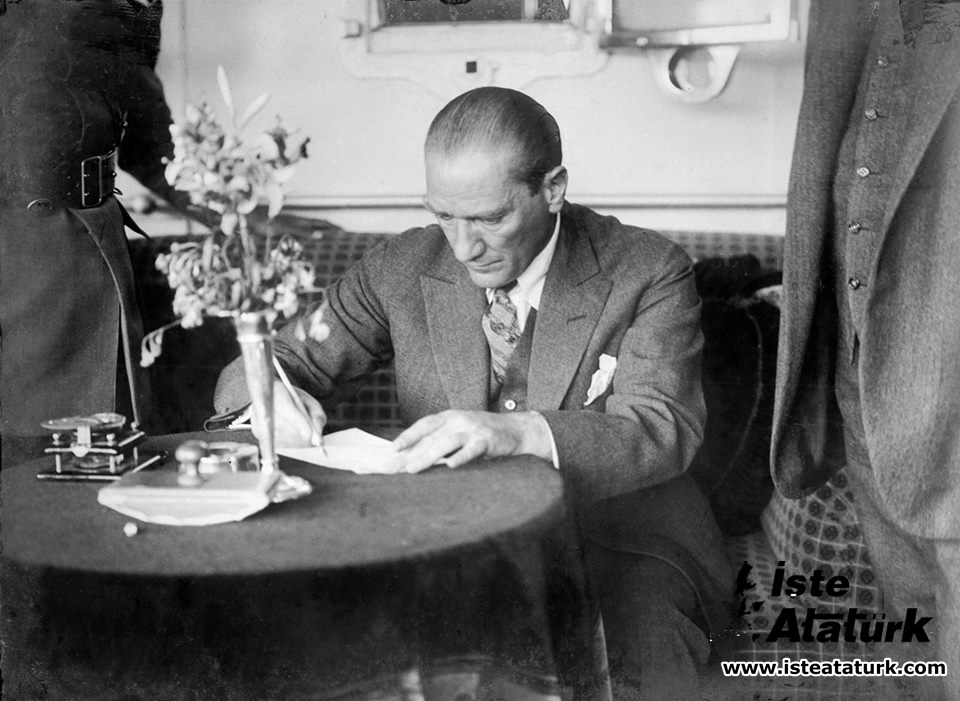
Atatürk and Democracy
Character Size
Atatürk and Democracy
ATATÜRK and DEMOCRACY
The Kemalist system of thought, as the main goal, has tended to establish a national, secular, strong and modern state in Turkey. There is no doubt that Atatürk thought of the modern state as a democratic state at the same time. The principle of democracy is also in close relationship with the other basic principles of the Kemalist thought system, such as republicanism, national sovereignty and populism.
Indeed, the principle of populism has often been used synonymously with political democracy. It is seen that populism has also been used in additional meanings such as equality before the law, no privileges for any person or group, rejection of class struggle, and the protection of balance and solidarity between social groups (solidarism, solidarisme) by the state's intervention in socio-economic life. However, in the development process of the Kemalist political regime, the dominant meaning of populism became political democracy.
It can be said that populism, together with the principles of nationalism, national sovereignty and full independence, is one of the most emphasized elements of the Kemalist thought system since the first days of the National Struggle. Populism took place as one of the main guiding principles of the new regime in Atatürk's numerous speeches during the years of the National Struggle. For example, “the essential nature of our existence today has proven the general tendencies of the nation, which is populism and people's government. Governments are in the hands of the people... Let's work to hand over the administration to the people. Then, I believe that all difficulties will disappear.”' “The principle of populism, which is our motto in our domestic politics, that is, the principle of making the nation dominate its own destiny has been determined by our Law on the Organization of Fundamental Organization.”2 “Our point of view is that of the power, of the populism. your might, dominance, administration, is given directly to the people, is to be held in the hands of the people. Again, there is no doubt that this is the strongest principle of the world.”3
“Our administration method is based on the principle that the people, who have unconditional domination, personally and actively manage their destiny... It is one of the requirements of our policy that the people's administration reaches the level of development it deserves in all its inclusive senses.”4 “If we have to put it in a word, we can say that the new Turkish State it is a people's state, a people's state.”5
The principle of populism was also expressed in the most important constitutional documents of the years of the National Struggle. The document that forms the basis of the 1921 Constitution is called the “Populism Programme”. Atatürk said the following in his Speech: “I presented a program dated September 13, 1920, which was the origin of our First Organization of Esasiye Law, to the Parliament. Apart from the part of this program that was read in the Assembly on September 18, but on the basis of this, my proposal, which determined the main nature of the Grand National Assembly and the views on the administrative procedure, and which was read and accepted after the opening of the Assembly, together with this part, included the populist program. I had it printed and published under the title of 0 The part of this proposal, named “purpose and profession” (purpose and method), was published as a declaration by the Grand National Assembly, The sections under the titles of “mavaddi principals” (main articles) and “administration” formed the basis of the Constitution dated January 20, 19217. In the first article of this Constitution, “The prerequisite for sovereignty is the nation's. He placed the principle of populism in the foreground by saying that the method of administration is based on the principle that the people personally and actively manage their destiny. Later, while Atatürk was planning to found a political party, he announced to the Ankara press on 7 December 1922 that he "intends to form a political party (party) based on the principle of populism and under the name of the People's Party"8. The name of the People's Party, which was founded in September 1923, was undoubtedly inspired by the principle of populism, and populism was included in the 1st and 2nd articles of the first party Regulation (Statute) of 1923. In the first article of this Constitution, “The prerequisite for sovereignty is the nation's. He placed the principle of populism in the foreground by saying that the method of administration is based on the principle that the people personally and actively manage their destiny. Later, while Atatürk was planning to found a political party, he announced to the Ankara press on 7 December 1922 that he "intends to form a political party (party) based on the principle of populism and under the name of the People's Party"8. The name of the People's Party, which was founded in September 1923, was undoubtedly inspired by the principle of populism, and populism was included in the 1st and 2nd articles of the first party Regulation (Statute) of 1923. In the first article of this Constitution, “The prerequisite for sovereignty is the nation's. He placed the principle of populism in the foreground by saying that the method of administration is based on the principle that the people personally and actively manage their destiny. Later, while Atatürk was planning to found a political party, he announced to the Ankara press on 7 December 1922 that he "intends to form a political party (party) based on the principle of populism and under the name of the People's Party"8. The name of the People's Party, which was founded in September 1923, was undoubtedly inspired by the principle of populism, and populism was included in the 1st and 2nd articles of the first party Regulation (Statute) of 1923. Later, while Atatürk was planning to found a political party, he announced to the Ankara press on 7 December 1922 that he "intends to form a political party (party) based on the principle of populism and under the name of the People's Party"8. The name of the People's Party, which was founded in September 1923, was undoubtedly inspired by the principle of populism, and populism was included in the 1st and 2nd articles of the first party Regulation (Statute) of 1923. Later, while Atatürk was planning to found a political party, he announced to the Ankara press on 7 December 1922 that he "intends to form a political party (party) based on the principle of populism and under the name of the People's Party"8. The name of the People's Party, which was founded in September 1923, was undoubtedly inspired by the principle of populism, and populism was included in the 1st and 2nd articles of the first party Regulation (Statute) of 1923.
In the quotations we have given above about populism, we have seen that this expression is used synonymously with the people's state, the people's government, the people's control over their own destiny, in short, with political democracy. Atatürk used populism and the "democracy principle" in the same sense in his notes on the Civil Information book: "According to this principle, will and dominance belong to and should belong to the entire nation. The principle of democracy has turned into a form of national domination ... In governments based on the principle of democracy, the dominance belongs to the people, the majority of the people. The principle of democracy requires that sovereignty is in the nation and not elsewhere. In this way, the principle of democracy touches on the source and legitimacy of political power and dominance. According to Atatürk, “today, the idea of democracy always resembles a rising sea.
There is no doubt that there is a very close relationship between the principle of populism (or democracy) and national sovereignty. More precisely, populism is the natural and necessary consequence of the principle of national sovereignty. In a state where the sovereignty is in the nation, the government system must of course be self-governing, that is, democracy. However, there have been times in history when these two concepts did not exactly coincide. Although the French Revolution and the following period demolished personal sovereignty and replaced it with national sovereignty in theory, the universal suffrage system was not accepted for a long time, that is, the majority of the people were not given the right to vote. This contradictory situation means that the nation and the people are different concepts; that the nation is not just the sum of the people living in a certain country at a certain moment, but constitutes a "spiritual person" (legal person) that includes the past and the future; thereby, It has been tried to be explained with unsatisfactory reasons, such as that sovereignty in the name of the nation should be used by an elite group that can best appreciate the interests of the nation10. Undoubtedly, the Kemalist understanding of national sovereignty is not such an abstract and far from democracy understanding of national sovereignty. Kemalism aimed not only to overthrow the personal sovereignty of the monarch, but also to replace it with popular government, that is, democracy. The completion of the national sovereignty with the principle of populism in the Kemalist thought system gave it its democratic content. It is not such an abstract and non-democratic understanding of national sovereignty. Kemalism aimed not only to overthrow the personal sovereignty of the monarch, but also to replace it with popular government, that is, democracy. The completion of the national sovereignty with the principle of populism in the Kemalist thought system gave it its democratic content. It is not such an abstract and non-democratic understanding of national sovereignty. Kemalism aimed not only to overthrow the personal sovereignty of the monarch, but also to replace it with popular government, that is, democracy. The completion of the national sovereignty with the principle of populism in the Kemalist thought system gave it its democratic content.
Atatürk used the term "democracy" not by deviating from its original meaning or by adding different contents to it, as seen in some countries today, but on the contrary, in its real and traditional sense, that is, to express liberal political democracy. Atatürk says the following on this subject: “Democracy is essentially of a political nature. Democracy is not a social aid or an economic organization system. Democracy is not a matter of material well-being, either. Such a theory aims to assuage the citizens' need for political freedom. The democracy we know is particularly political; its goal is to ensure political freedom through the nation's control over the rulers.
By criticizing contemporary political currents that are contrary to democracy, Atatürk concluded that none of them is suitable for Turkey: According to the Bolshevik theory, "a minority consisting of workers, naval and land forces from among the entire Russian nation has formed a dictatorship by uniting under the name of the communist party based on economic principles. . They are not national in their purpose. They do not recognize personal freedom and equality. They do not respect popular sovereignty. They compel the majority internally to obey their views by force and coercion; outside, they try to spread their own principles. However, the purpose of forming a government is primarily to ensure individual freedom. The nature of tyranny is seen in the form of the Bolshevik government. The way that a society is forcibly enslaved by the views of some people and perpetuating tyranny cannot be viewed with the view of a natural and reasonable government system.”
Atatürk also criticized the "revolutionary syndicalism" and "corporatism" movements, which were quite strong in some European countries, especially in the Latin Mediterranean countries, during his lifetime. According to him, “revolutionary, political syndicalism theorists are groups of workers who want to run all kinds of political institutions only in favor of their own interests and finally to seize political power and dominance. While they wait for the opportunity to achieve their aims by force, they exert influence over government officials, occasionally carrying out general strikes.” Corporatism or the representation of interests (professional representation), on the other hand, argues that various professional groups have different interests in society, and that each group with special interests should be represented separately in the parliament. “In this case, the election will not be made by the members of the nation, but by the people. It will take place by groups and in proportion to the interests these groups have. In the assembly, when a few of these groups unite and take power, they will only work in favor of their own interests. Who will prevent this?”
It is for these reasons that Atatürk did not see these political movements, which are against democracy, as "appropriate for our country and our nation". According to him, “we consider the help of the members of the people of the country and members of various classes to each other as the same value and nature; we would like to try to ensure the interests of all of them to the same degree and with the same sense of egalitarianism. We believe that this style is more suitable for the general welfare of the nation and for the strengthening of the state structure. In our opinion, the rights, interests and freedoms of a farmer, shepherd, worker, trader, artist, doctor, in short, a citizen working in any social institution are equal. In our opinion, it is possible to help the state with this understanding and to use the trust and will of the nation properly, with the administration of the people's government as we understand it.
It is clear from his following views on the importance of freedom that what Atatürk meant by populism was "libertarian political democracy" in the traditional sense. According to Atatürk, “the first right of the individual is to freely develop his natural abilities. In order to ensure this development, the best means is to allow the individual to manage himself as he wishes, without harming the similar rights of others, at his own risk and harm. Ensuring this free development is the whole purpose of the various freedoms created by individual rights. The political society that does not respect these rights will fail in its main duty, and the state will lose the reason and meaning of its existence. In contemporary democracy, individual liberties have taken on a special value and importance; There is no longer any interference by the state or anyone in individual freedoms. . In order to break the chains of tyranny and bondage, the Turk put his life on the line against internal and external enemies; entered into very bloody and dangerous struggles; endured innumerable sacrifices; He succeeded, but after that he got his freedom. For this reason, freedom is the life of the Turk.” 13
Freedom, which is of such great importance in personal and social life, cannot be understood in its absolute sense. “The freedom in question is social and civil human freedom. For this reason, when considering individual freedom, it is necessary to consider the common interest of each individual and finally the entire nation and the existence of the state. It turns out that individual freedom cannot be absolute. The rights and freedoms of others and the common interest of the nation limit individual freedom. Limiting individual freedom is almost the basis and duty of the state. Because, although the state is an organization that ensures individual freedom, it is also obliged to combine all private activities for general and national purposes... The result of a stateless society or a weak state life is the struggle of everyone against everyone. This struggle must be altered so as not to stifle the freedom of the majority. Thus, although the state and social life necessitates the limitation of individual freedoms, this limitation should not be taken to a degree that would harm the responsibility, initiative and development of the individual. The more the citizens' sense of enterprise and responsibility develops, the better for the state.” 14
Populism, which is used as a synonym for democracy in the Kemalist thought system, developed in the democratic atmosphere of the years of the National Struggle and especially of the Turkish Grand National Assembly. One of the most remarkable aspects of our National Struggle is that this life-or-death struggle was carried out by a democratic assembly, which is competent in terms of law and uses its supervisory powers meticulously and jealously in practice. prof. As Feyzioğlu stated, “The War of Independence was won by an Assembly that takes strength from the principle of national sovereignty, takes accountability in every matter, criticizes it and protects the rights of the nation meticulously. The fact that a great war is managed and carried out by a parliament on behalf of the nation is an event worthy of attention in terms of world history.” İsmet İnönü also said the following on the same subject: “The political administration of the National Struggle was as gentle as it was at the military stage. It could even be said to be more gentle. Atatürk was equally skilful and more skillful in the administration of the political stage. For example, in my opinion, the establishment of a National Assembly and carrying out the National Struggle together with it was an extremely difficult, but wonderfully correct decision. Its precedent is almost non-existent.” 15 In the field of domestic and foreign policy, this is a marvelous invention. Its precedent is almost non-existent.” 15 In the field of domestic and foreign policy, this is a marvelous invention. Its precedent is almost non-existent.” 15
After the First Grand National Assembly of Turkey (1920-23) completed its historical task and the Second Term Turkish Grand National Assembly was formed with the renewal of the elections, the decision to make the political regime of the new Turkish State a democratic regime continued. Atatürk repeated his belief in the democratic regime in his various statements during this period. For example, in a speech he gave to the Times correspondent on December 11, 1924, he said: “The existence of political parties is natural, especially in countries that are based on national sovereignty and have a republican administration. There is no doubt that parties that control each other will emerge in the Republic of Turkey.”16 As a matter of fact, in this environment, a group of deputies who left the People's Party in November 1924 established an opposition party called the Progressive Republican Party. Unfortunately, this trial of multi-party life did not last long, and when the Sheikh Said rebellion in the eastern provinces in February 1925 reached very serious dimensions, it was necessary to take extraordinary measures; The Law of Reconciliation dated March 4, 1925 gave the government wide discretionary powers; Extraordinary Independence Courts, which were operated during the War of Independence, but were later abolished, were re-established. Among these measures, the Progressive Republican Party was closed on 3 June 1925 by the decision of the Council of Ministers. The interesting point is that the mentioned extraordinary measures were never shown as permanent and desirable policies, but were justified by the compelling requirements of the current situation. As a matter of fact, in the book of Civil Information, "Laws such as the Law of Treason, Vataniye and the Law of Independence Courts... It is counted among the extraordinary measures for the protection of the Republic... Such laws, of course, are not always enforced. They ... are only applied as a necessity when faced with great dangers that cannot be avoided with other measures”. '7 Atatürk expressed the same idea in his Speech as follows: and in no way did we use it as a means to rise above the law; on the contrary, we applied it to establish peace and security in the country; We used it to ensure the life and independence of the state. We made those measures beneficial for the civil and social development of the nation.
In 1930, Atatürk tried again to adopt a multi-party system, and for this purpose, he suggested to one of the former Prime Ministers, Ambassador to Paris and his close friend Fethi (Okyar) Bey, to establish an opposition party. Founded on 12 August 1930 under the name of the Free Republican Party, this party received encouragement and assistance from Atatürk. The following letter, which Atatürk wrote to Fethi Bey on the occasion of the establishment of the party, is very important in terms of expressing his views on democracy: “In the Grand National Assembly and in front of the nation, the free discussion of the affairs of the nation and the pursuit of the best interests of the nation by revealing the thoughts of well-intentioned individuals and sects. is a system that I have been in love and support of since my youth... I am glad to see that we are together on the basis of secularism. In fact, this is the basis that I have always sought and will seek in my political life as a one-sided. Therefore, I consider it as a republican principle that a new party based on the same basis in the Grand Assembly will come into operation and discuss the affairs of the nation freely. In this respect, I have undoubtedly welcomed you to enter the political struggle to follow your views. As long as I am the President, you can be confident that I will perform the high and legal duties assigned to me by the Presidency, fairly and impartially against the parties in the government or not, and that all kinds of political activities and currents of your party will not be hindered within the framework of the secular republic, sir.”19 Establishment of the Free Republic Party. It is well understood from the following words that Atatürk perceived himself as an impartial arbiter between the two parties in his days: “I predict that they will struggle a lot with the leaders of the Republican People's Party. But I will gladly observe these struggles that will strengthen the foundations of the Republic, and I can say in advance that I will gather you at my table on the nights when you have the most quarrels, and then I will ask each of you separately: What did you say? What did you say for? What was your answer? What was he relying on? I confess today that it will be a great pleasure for me.”20 What did you say? What did you say for? What was your answer? What was he relying on? I confess today that it will be a great pleasure for me.”20 What did you say? What did you say for? What was your answer? What was he relying on? I confess today that it will be a great pleasure for me.”20
However, the Free Republic Party trial, which was undertaken with such good intentions, lasted only three months. Despite the undisputed loyalty of the leaders of the Free Party to Atatürk and his reforms, it was seen that some elements against the reforms tried to infiltrate the Free Party, since the time required for the reforms to be adopted and settled by the society had not yet passed. In the atmosphere of political hardening caused by this, the Free Republican Party, seeing that the conditions might bring them against Atatürk, decided to dissolve itself.21 Although this experiment did not give the desired result, as the famous French constitutional lawyer and political scientist Maurice Duverger stated, even the fact that these attempts were made “has a deep meaning on its own. In Hitler's Germany,
Indeed, aside from the three-month Free Party trial, Turkey was governed by a one-party regime from the closure of the Progressive Republican Party in 1925 until the transition to the multi-party regime in late 1945. However, this regime is fundamentally different from the Fascist and Communist one-party systems based on totalitarian and dogmatic ideologies. There has been a one-party “phenomenon” in Turkey, but no one-party ideology or doctrine. In other words, one-party is not legitimized as a permanent and desirable model in Turkey; on the contrary, it was seen as a temporary regime that was resorted to due to necessity and would be replaced by pluralist democracy when the time came. Multi-party political democracy has been preserved as an ideal to be attained, as experiments in this field have shown. According to Duverger, which we would like to witness once again, the "primary feature of the Turkish single-party is its democratic ideology. This ideology has never been a Sect or Church like Fascist or Communist ideologies; it did not impose a faith or a mystic on its members ... The anticlerical and rational attitude of the ruling cadres of the party clearly brought them closer to nineteenth century Liberalism ... Even the name 'Republican' puts this party more in favor of the French Revolution and the nineteenth century than the authoritarian regimes of the twentieth century. It brings it closer to the terminology of the 20th century... The defense of authority, which is encountered every day in fascist regimes, has been replaced by the defense of democracy in Kemalist Turkey; this is traditional political democracy, not a 'new' democracy characterized as 'popular' or 'social'. Party, the right to rule,
It is very well understood from the following words that Atatürk said in the days when the preparations for the establishment of the Progressive Republican Party were made, that he saw the one-party system not as a permanent ideal for Turkey, but as a temporary period brought about by necessity at a certain stage of Turkey's social and political development. : The main principle of the Republican People's Party is to work for the real peace and happiness of the country and the nation, and I think this is the path that leads to the goal, and it is clear. It is to guide the nation to strengthen and consolidate the Republic, as well as to ensure that the nation walks with determination and success in intellectual and social revolution, civilization and innovation. The passengers of this obvious but undoubtedly tiring and long road may not walk in a straight line from the beginning to the end and at the same time with the same degree of fatigue, and in this case, there may be a difference between their thoughts and precautions. But they must not deviate from the path, keep their eyes on the general goal, and not violate the main purpose. Today we are at the beginning of the obvious road. It has not yet been advanced enough to affect thoughts. Opinions must be sufficiently clear and accurate. Before that, the idea of a division was ordinary sectarianism, where the conditions of peace and security of the country and nation are not yet suitable for such a division, gentlemen...”23 Again, in the months following the dissolution of the Free Republican Party, Atatürk said the following in the same direction. : “There are some periods in the history of nations that In order to achieve certain goals, it is necessary to gather all the material and spiritual forces together and direct them in the same direction. In recent years, our nation has realized the important consequences of such a gathering and unification movement. All nationalist and republican forces must be gathered in one place for the country and the revolution to be immune from the dangers that may come from within and from outside.
After the Unsuccessful Trial of the Free Party, some attempts were made on the path of democracy. For example, in the 1931 and 1935 parliamentary elections, some of the parliamentary positions were not nominated by the Republican People's Party, and these seats were left to independent candidates. In both the program declaration of the Republican People's Party accepted at the 1927 Congress and the program accepted at the 1931 Congress, it was stated as a goal to switch to single-stage elections. The 1931 program says exactly this on the subject: “It is one of our lofty ambitions to apply a degree of adjustment. However, it is necessary to equip the citizen with the qualifications, conditions and means by which he can recognize his choice. Until the day when the work to achieve this will give the desired result, We find it more appropriate to the real necessities of democracy to let people whom we know and trust closely be free to choose.” At the 1939 Party Congress, it was decided to establish an “Independent Group”, which would be formed by a group of deputies who would leave the CHP group, to act as an audit within the Turkish Grand National Assembly. In the 1943 parliamentary elections, the CHP gave a certain freedom of choice to the voters, even among their own candidates, by nominating 530 candidates for 458 deputies. Finally, the real multi-party system was implemented in 1945 by allowing the establishment of opposition parties. It is beyond our subject to examine these stages of our democracy history. However, it should be emphasized here that Turkey can not be a part of a one-party system without any forcible interruptions such as war, occupation, revolution, coup, etc. it is one of the few instances where it has become a pluralistic democracy under its own laws of evolution. The main reason for this is the democratic character of the Kemalist worldview.
1 Atatürk's Speeches and Statements, c. I (Ankara, 1961: Turkish Revolution History Institute Published) (In future references, SD will be abbreviated as I), p. 90.
2 SD, I, p. 166.
3 SD, I, p. 101.
4 SD, I, p. 221.
5 SD. Work. 320.
6 Kemal Atatürk, Speech (Istanbul, i960: Turkish Revolution History Institute Published) (will be abbreviated as Speech in future references), c. II, p. 594.
7 İsmail Arar, Atatürk's Populism Program (Istanbul, 1963: Baha Printing), p. 13-16; Ergun Özbudun, “The Legal Character of the Government of the Grand National Assembly of Turkey,” Atatürk Research Center Journal, c. I, Issue 2 (March 1985), p. 498.
8 Speech, II, p. 718.
9 A. Afetinan, Civil Information and M. Kemal Atatürk's Handwritings (Ankara, 1969: Turkish Historical Society Published) Hereinafter, it will be abbreviated as Civil Information), p. 27, 29-30, 390-91, 397-99, 404-10 Hüseyin Nail Cubali, Constitutional Law: General Principles and Political Regimes (Istanbul, 1965), p. 358-63.
11 Civil Information, p. 31, 406-407.
12 Ibid., p. 40-41, 420-25.
13 Ibid., p. 52-54, 458-64.
14 Ibid., p. 52-53, 459-62; Kemalism, Third Book: Kemalist Thought System (Istanbul, 1984: Prepared by the National Education Press, General Staff), p. 70-73.
15 Turhan Feyzioğlu, “Atatürk and Nationalism,” Atatürk Research Center Journal, c. I, Issue 2 (March 1985). s. 402.
16 Atatürk's Speeches and Statements, c. III (Ankara, 1961: Turkish Revolution History Institute Published) (In future references, SD will be abbreviated as III), p. 77.
17 Civil Information, p. 67.
18 Speech, II, p. 894.
19 Cetin Yetkin, Free Republican Party Incident (Istanbul, 1982: Karacan Publications), p. 251-52.
20 Atatürk's Speeches and Statements, c. II (Ankara, 1959: Turkish Revolution History Institute Published) (In the future, it will be abbreviated as SD, II), p. 255-56.
On the 21 Free Republic Party, see. Yetkin, ibid; Fethi Okyar, A Man in Three Ages (Istanbul, 1980: Tercüman Published); Walter F. Weiker, Political Tutelage and Democracy in Turkey: The Free Party and its Aftermath (Leiden, 1973: EJBrill).
22 Maurice Duverger, Political Parties (Ankara, 1974: Bilgi Publishing House), p. 360-61.
23 Ibid., p. 359-60.
24 The phrase “potential democracy” belongs to Duverger. See. same work, p. 363-64. For the concept of “tutelary democracy”, see. Ergun Özbudun, “The Nature of the Kemalist Political Regime,” Ali Kazancıgil and Ergun Özbudun (ed.) Atatürk: Founder of a Modern State (London, 1981: C. Hurst), p. 79-102.
25 SD, II, p. 191. These statements are clear proof that the one-party regime is seen as temporary and conditional.
26 SD, III, p. 90.
Prof. Dr. Ergun Özbudun
Source: ATATÜRK ARAŞTIRMA MERKEZİ DERGİSİ, Sayı 14, Cilt V, Mart 1989
